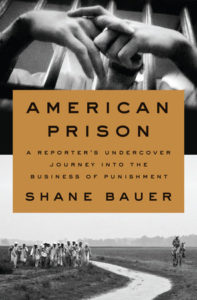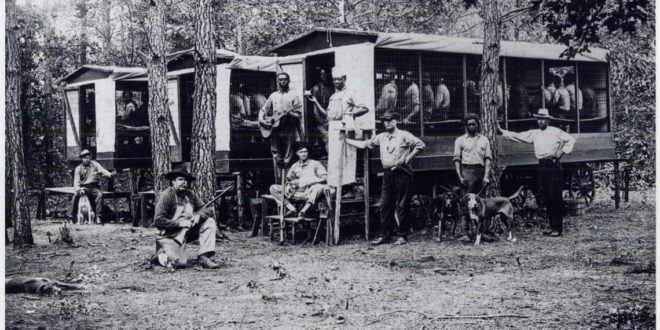Podcast: Play in new window | Download (Duration: 58:59 — 44.9MB)
 Our opening song is “I’ve Grown So Ugly” by Robert Pete Williams, who was imprisoned in the Louisiana State Penitentiary in the mid 1950s.
Our opening song is “I’ve Grown So Ugly” by Robert Pete Williams, who was imprisoned in the Louisiana State Penitentiary in the mid 1950s.
The rest of our music is by women prisoners and will come from field recordings taken in the 1930s and 40s from such plantation prisons as Parchman in Mississippi and Angola in Louisiana.
In 1935, Parchman prisoner, Mary Carter, changed the lyrics of the blues classic, “Catfish Blues,” to highlight how women’s blues differed from men’s.
If I were a catfish swimming deep dawn in the see I could have all these Parchman men fishing after me. ….
When a woman takes the blues she goes to her room and hides. And when a man takes the blues he catches a train and rides.
The female population at Parchman was small. Out of nearly 3,500 prisoners in 1935, just 26 were women. During the Depression years, the women prisoners numbered between 20 and 60, a fraction of the total, which rose from about 3,000 to as many as 6,000. But, females in the convict labor system were generally young and literate, and their crimes, as recorded, were generally violent.
I was prompted to begin this way because of what today’s guest Shane Bauer wrote in his investigative piece, “My Four Months as a Private Prison Guard” which was published in Mother Jones in the summer of 2016: “Like the prisoners, the majority of the COs at Winn are African American. More than half are women, many of them single moms.”
In the book that grew out of that Mother Jones article, American Prison: A Reporter’s Undercover Journey Into the Business of Punishment, Bauer weaves a deep reckoning of his experience as a guard in a for-profit prison together with a thoroughly researched history of prisons in America from their origins in the decades before the Civil War. We can’t understand the cruelty of our current system and its place in the larger story of mass incarceration without understanding that history. Private prisons became entrenched in the South as part of a systemic effort to keep the African-American labor force in place in the aftermath of slavery. But perhaps a more important lesson here is that what is private is also public–there can be no private, for-profit prisons, without the support of and funding by the state.
American Prison takes us through Bauer’s hiring and employment at Winn Correctional Center, a private prison ten miles southeast of Winnfield, Louisiana, operated at the time by CCA, Corrections Corporation of America. CCA has since changed its name to CoreCivic, moving from the shadow of an acronym to the fake sunshine of an innocuous-sounding name–think of the private mercenary corporation Blackwater becoming Xe only to change its name a third time, or tobacco giant Philip Morris becoming the Altria Group.
But perhaps there is truth in this name. The penal colony might be the best description of what’s at the core of capitalism: the abusive economic system we blindly praise, as well as the so-called justice system we revere for its purported blindness. CoreCivic sounds about right.
GUEST
 Shane Bauer is a senior reporter at Mother Jones magazine. In 2015, Shane took a job as a prison guard in Louisiana to investigate corporate-run prisons, the subject of the award-wining piece, “My Four Months as a Private Prison Guard.” In 2016, he went undercover again to investigate America’s resurgent right-wing paramilitary movement. Earlier in his career, Shane focused on the Middle East, reporting from locations such as Iraq, Sudan, Chad, Syria, Lebanon, Yemen, and Israel/Palestine. His articles have appeared in The Nation, Salon, Los Angeles Times, San Francisco Chronicle, Christian Science Monitor, and many other publications.
Shane Bauer is a senior reporter at Mother Jones magazine. In 2015, Shane took a job as a prison guard in Louisiana to investigate corporate-run prisons, the subject of the award-wining piece, “My Four Months as a Private Prison Guard.” In 2016, he went undercover again to investigate America’s resurgent right-wing paramilitary movement. Earlier in his career, Shane focused on the Middle East, reporting from locations such as Iraq, Sudan, Chad, Syria, Lebanon, Yemen, and Israel/Palestine. His articles have appeared in The Nation, Salon, Los Angeles Times, San Francisco Chronicle, Christian Science Monitor, and many other publications.
RELATED
My Four Months as a Private Prison Guard by Shane Bauer
The True History of America’s Private Prison Industry by Shane Bauer
The Origins of Prison Slavery by Shane Bauer
Parchman Women Write the Blues? What Became of Black Women’s Prison Music in Mississippi in the 1930s by Shobana Shankar
Embodied By Prisons: First the Whip, Then the Chains, and Then…(Interchange)
Prison Plantations
MUSIC
“I’ve Grown So Ugly” by Robert Pete Williams
Jailhouse Blues: songs from the Parchman Penitentiary
Library Of Congress field recordings, 1936 and 1939.
“Penitentiary Blues” sung by Beatrice Tisdall
“Gonna Need My Help Someday” sung by Elinor Boyer
“Go ‘Way Devil Leave Me Alone” sung by Mary James
“Workhouse Blues” by Mattie Mae Thomas
CREDITS
Producer & Host: Doug Storm
Studio Engineer: Wes Martin
Executive Producer: Wes Martin
 WFHB Bloomington Community Radio
WFHB Bloomington Community Radio


